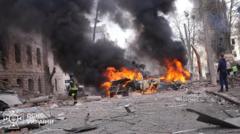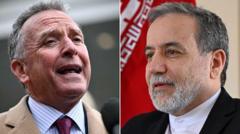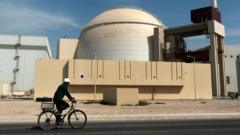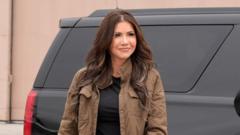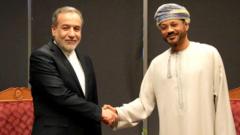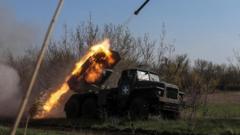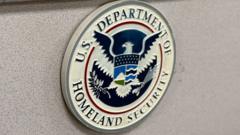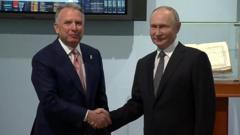This article examines the diplomatic discussions surrounding the ongoing conflict in Ukraine, the urgency expressed by former President Donald Trump, and the implications for US-Russia relations.
**US Envoy Discusses Ukraine Ceasefire with Putin Amid Trump’s Urgency for Action**
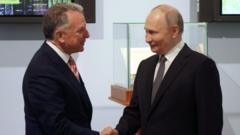
**US Envoy Discusses Ukraine Ceasefire with Putin Amid Trump’s Urgency for Action**
Diplomatic tensions mount as US envoy meets Russian president and Trump calls for expedited ceasefire.
In a notable diplomatic engagement, US special envoy Steve Witkoff met with Russian President Vladimir Putin at the Presidential Library in St. Petersburg. The meeting, which lasted over four hours, centered on a potential resolution to the ongoing conflict in Ukraine, marking Witkoff's third encounter with the Russian leader this year. Special envoy Kirill Dmitriev characterized the discussions as "productive," reflecting a continuous effort towards normalizing relations despite the protracted war.
Former President Donald Trump, who has been vocally frustrated with the slow progress of negotiations, urged Putin to "get moving" towards achieving a ceasefire. In a social media post, he lamented the escalating loss of life due to the conflict, emphasizing the urgency for action: "Too many people are DYING, thousands a week, in a terrible and senseless war." Trump’s remarks come as his Ukraine envoy Keith Kellogg faced backlash for allegedly suggesting a partitioning of Ukraine, which he later denied, clarifying his statements to focus on a post-ceasefire resiliency force supporting Ukrainian sovereignty rather than territorial division.
Simultaneously, European nations announced a substantial military aid package worth €21 billion ($24 billion) for Ukraine, suggesting that there is currently no indication of an imminent resolution to the conflict, as echoed by European defense ministers. Kremlin spokesperson Dmitry Peskov tempered expectations ahead of the Witkoff-Putin talks, advising against hope for immediate breakthroughs.
Prior to his meeting with Putin, Witkoff convened with Dmitriev, highlighting a strategic dialogue between the nations. Dmitriev recently visited Washington, marking a significant diplomatic moment, as he is the highest-ranking Russian official to travel to the US since the invasion of Ukraine began.
Amid these discussions, Ukrainian President Volodymyr Zelensky accused Russia of deliberately prolonging the conflict. During a visit to the site of a deadly missile strike in Kryvyi Rih, Zelensky questioned the involvement of Chinese nationals in the Russian military, a claim dismissed by Russian Deputy Foreign Minister Andrey Rudenko.
Zelensky reiterated his call for advanced air defense systems from the West, emphasizing that Ukraine now seeks to purchase additional resources to safeguard its citizens, reflecting the nation’s ongoing struggle for security against Russian aggression. Trump suggested that the war could have been avoided entirely under his leadership, asserting he could resolve the conflict quickly if reinstated as president.
In broader diplomatic developments, discussions between US and Russian officials continue, with blocked ceasefire talks highlighting the stalled process of restoring full diplomatic relations. Notably, a recent prisoner swap between the two nations underscores the complex, contentious landscape of US-Russia relations as the war in Ukraine persists with no clear end in sight.
Former President Donald Trump, who has been vocally frustrated with the slow progress of negotiations, urged Putin to "get moving" towards achieving a ceasefire. In a social media post, he lamented the escalating loss of life due to the conflict, emphasizing the urgency for action: "Too many people are DYING, thousands a week, in a terrible and senseless war." Trump’s remarks come as his Ukraine envoy Keith Kellogg faced backlash for allegedly suggesting a partitioning of Ukraine, which he later denied, clarifying his statements to focus on a post-ceasefire resiliency force supporting Ukrainian sovereignty rather than territorial division.
Simultaneously, European nations announced a substantial military aid package worth €21 billion ($24 billion) for Ukraine, suggesting that there is currently no indication of an imminent resolution to the conflict, as echoed by European defense ministers. Kremlin spokesperson Dmitry Peskov tempered expectations ahead of the Witkoff-Putin talks, advising against hope for immediate breakthroughs.
Prior to his meeting with Putin, Witkoff convened with Dmitriev, highlighting a strategic dialogue between the nations. Dmitriev recently visited Washington, marking a significant diplomatic moment, as he is the highest-ranking Russian official to travel to the US since the invasion of Ukraine began.
Amid these discussions, Ukrainian President Volodymyr Zelensky accused Russia of deliberately prolonging the conflict. During a visit to the site of a deadly missile strike in Kryvyi Rih, Zelensky questioned the involvement of Chinese nationals in the Russian military, a claim dismissed by Russian Deputy Foreign Minister Andrey Rudenko.
Zelensky reiterated his call for advanced air defense systems from the West, emphasizing that Ukraine now seeks to purchase additional resources to safeguard its citizens, reflecting the nation’s ongoing struggle for security against Russian aggression. Trump suggested that the war could have been avoided entirely under his leadership, asserting he could resolve the conflict quickly if reinstated as president.
In broader diplomatic developments, discussions between US and Russian officials continue, with blocked ceasefire talks highlighting the stalled process of restoring full diplomatic relations. Notably, a recent prisoner swap between the two nations underscores the complex, contentious landscape of US-Russia relations as the war in Ukraine persists with no clear end in sight.

